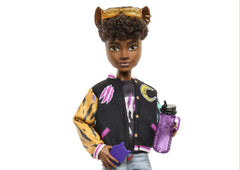Celebrating Uniqueness through Self-Expression
Self-expression serves as a powerful tool for children to showcase their authentic selves to the world. It allows them to share their passions, values, and beliefs, fostering a sense of connection and confidence. Encouraging self-expression enables kids to connect with like-minded individuals and embrace their individuality. However, self-expression can be challenging, particularly for teenagers who face various obstacles. Let's explore some common issues they encounter and how self-expression can help overcome them.
Overcoming Challenges to Self-Expression
-
Bullying: Breaking the Cycle of Isolation Bullying, whether offline or online, can isolate and damage a teenager's self-esteem. By encouraging self-expression, we create an environment where teens can share their experiences, find support, and cultivate resilience.
-
Body Image: Embracing Authenticity Adolescence often brings self-consciousness about physical appearance. Through self-expression, teens can embrace their unique attributes, challenging societal beauty standards and fostering self-acceptance.
-
Academic Pressure: Finding Balance The relentless academic pressure can be overwhelming. Self-expression provides an outlet for teenagers to explore their interests and passions beyond the confines of academic expectations, promoting holistic development.
-
Family Problems: Healing and Connection Teens navigating familial challenges such as divorce, substance abuse, or financial hardships may struggle with self-expression. Creating a safe space where they can express their feelings and find understanding can support their emotional well-being.
-
Mental Health Issues: Empowering through Expression Mental health struggles, including depression and anxiety, can hinder self-expression. Encouraging creative outlets, active listening, and providing a non-judgmental environment help teens process their emotions and seek support when needed.
Nurturing Self-Expression
To promote self-expression and prevent crises such as suicide, here are effective strategies:
-
Encourage Creative Expression: Art, music, and writing offer powerful avenues for emotional expression and connection with others. Encourage teens to explore these creative outlets to communicate their feelings.
-
Practice Active Listening: By actively listening to teens, we convey empathy and create a safe space for open dialogue. Show genuine interest in their thoughts and emotions, validating their experiences.
-
Create a Safe Space: Establish an environment free from judgment and ridicule, where teens feel safe to express themselves authentically. Let them know they are accepted and supported for who they are.
-
Celebrate Uniqueness: Encourage teens to embrace their individuality, celebrating their unique qualities. Help them recognize that their differences are strengths that contribute to their identity.
On a final note

As children grow older, exposing them to inclusive content and products, such as Monster High, helps them appreciate and embrace their individuality. This fosters a more supportive and accepting world, cultivating resilience and self-esteem. While addressing self-esteem and mental health challenges can be complex, cultivating an inclusive and engaging environment through self-expression is a positive step toward nurturing the well-being of our children.










